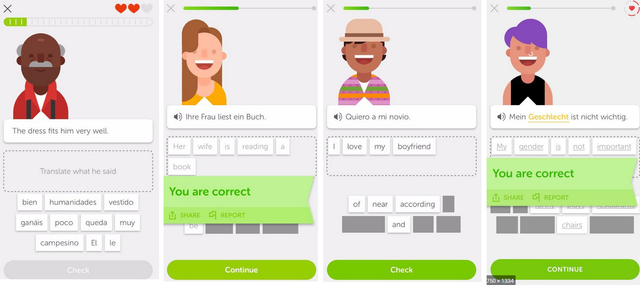Duolingo's Abusive Learning Methods: The App that Causes Mental Health Problems
"I'm just a cute little bird. I'm not robbing you of your attention for profit."
Since Duolingo's app is optimized for generating ad clicks and paid subscriptions, it has no real incentive to teach users a foreign language. Rather, it pays to thwart users' learning for as long as possible while the company's attention engineers use every trick in the book to keep users coming back to view more ads.
Have you ever met anyone who completed the German language tree on Duolingo and who was then able to converse in German? If you haven't, you should wonder what the app's ulterior motives are. Duolingo's punishing-yet-addictive exercises have little to do with language learning. In fact, the app has a lot more to do with a mental health crisis.
Frequently using Duolingo is like being in an abusive relationship with someone who always criticizes you for everything you did wrong. Each time you feel like breaking up, they lure you back in with a compliment and a guilt-trip, only to pile on more abuse.
The War for Your Attention
What genius group came up with the idea to interrupt people's language learning with commercial advertising every two minutes?
Duolingo was designed to punish you for breaking your "learning streak". You are supposed to come back every day to complete a minimum amount of exercises (and click ads). If you don't, you may lose your 10-day or 100-day streak. I don't know why it even matters, but the longer your streak, the more guilty you will feel about breaking it.
Luckily, you can buy a streak freeze from the "lingot" store. Or you can equip a monthly streak repair. But you'll have to do more exercises to earn these; and watch a few more ads in the process.
Attention Engineering
Now, language learning certainly requires frequent practice, but missing a day or two really isn't a big deal. Skipping a few classes actually gives your brain time to consolidate what you've learned. But Duolingo's engineers are terrified that you might not return to the app at all! So, they've created the most overblown attention-hijacking system ever devised.
With no fewer than three ways to earn fake internet points (XPs for daily progress, lingots for perks, and crowns for leveling-up skills), mixed in with pre-programmed complimentary and supporting messages from Duo the Owl, as well as the aforementioned punishment for breaking streaks, the app basically holds people captive until they decide to delete it.
And it works like a fly trap. Duolingo has almost 300 million users worldwide frequently returning to the app. It works so well because Duolingo makes you feel bad for postponing your learning (no fake points for you!) and gives you wonderful compliments when you come back.
Learning or Translating?
All is not well under Duolingo's wings. The app's setup simultaneously teaches you a foreign language and how to be a two-way translator. Every exercise on Duolingo is also a translation exercise. Duolingo expects you to produce your new language by speaking and writing it from the very start.
Mind you, learning to translate is not at all the same thing as mastering a new language. Translators and speakers have two distinctly separate skillsets. For example, very few people who can speak two languages fluently are able to translate between them in a professional manner (say, for book translations).
Translators and interpreters are in a profession of their own. But Duolingo forces you to both study the language & learn to translate it at the same time. This introduces a lot of mental overkill that is not conducive to language learning. It certainly makes the exercises a lot harder than needed.
More Overkill: Speak, Read, Listen & Write
Not only does Duolingo teach both the language and its translation, but it also bombards users with all four aspects of language usage: speaking, listening, reading, and writing.
How did you learn to speak your native tongue? You were probably a baby and all you did was listen to the sounds your mom and dad were making. There was no pressure on you whatsoever to begin to speak from day 1. You never even began to write until kindergarten - four years or so after your first exposure to the language.
You didn't even get good at writing until you were age ten or over. So why on earth does Duolingo expect you to write the new language from the start? To punish you!
Languages are primarily learned by first absorbing large quantities of it. This is best done passively. That means: first, you should be reading and listening to a new foreign language, and I mean a lot. Only after you've seen and heard large quantities of a new language does it begin to make sense to start learning how to use language.
Why? Because passively listening to a new language will provide you with a cushion, a mental backdrop, so to speak. It is from this cushion that you can then later draw your understanding of the language which is needed for speaking and writing exercises.
In fact, forcing students to write and speak a new language thwarts their ability to learn. Duolingo, of course, suffers from "instant feedback syndrome" - it wants users to feel the high of instantly being able to speak a few new words but does so by literally sabotaging your progress later on.
Words and Sentences without Context
When you were a baby, your parents and siblings were having long-form conversations around you. From time to time, your parents would turn to you and speak some simplified words to your baby ears. That way, everything you ever heard had context.
Duolingo only offers users a word-for-word and sentence-after-sentence approach that completely removes context. You're not hearing the stories. You're not emotionally involved in what is being said. Trying to learn a language by exposing yourself to random words and disconnected sentences will most likely give you a mental disorder.
(Indeed, by now, Duolingo has introduced a Stories section for several languages like Spanish and German. Those Stories are probably the only useful part of the Duolingo app. I strongly recommend users to focus only on the Stories, if available, and avoid the learning tree altogether.)
Punishment-Reward Is Counter-Productive
In regular learning mode, going down the Duolingo tree, you are stuck with a learning experience that is apparently sorted by grammatical topics. Each node on the learning tree comes with a distinct subject- like Sports or Weather - but also centers around a certain grammatical exercise - like "stem-changing verbs".
And this approach, again, is ludicrous. People just don't learn a language in some grammatical order. In adulthood as in childhood, people tend to pick up only the grammar they need to express themselves, and they won't ever have to acquire a full grasp of the grammar.
Let me repeat that: you can learn to speak any language without having to study any grammar. Furthermore, you don't even need to know the language's complete grammar in order to be understood. Some people live out their whole lives without knowing about certain verb tenses! If you don't use them, you don't need them.
Duolingo's grammar-first approach to language learning may very well be the perfect way for language teachers to structure their courses, but it may also be a stupid way for people to acquire any new language. Don't start with grammar, start with the stories, acquire what you need when you need it.
Mind Rape: Diversity & LGBT Propaganda
And then, all of a sudden, we discover what Duolingo is really about, besides selling ads and subscriptions. It's about propaganda. It's about programming your mind. Recognizing that so many people have an intrinsic desire to learn to speak another language, why not abuse all of that motivation to slip in diversity and LGBT propaganda?
Even though only about 0.5% of the general public are actual homosexuals, and even fewer are transgenders, in Duolingo's reality the gay, trans, and sexually diverse characters make up almost 50% of the population. It's only a 100-fold exaggeration. No big deal, right? Wrong. Trying to normalize people who are suffering from childhood abuse is not normal.
Since Duolingo gets so many people to come back every day, or multiple times per day, to repeat the same exercises over and over until they get them right, Duolingo not only maximizes its ad revenue, but it also teaches people to adopt new political beliefs. At least, it attempts to do so by repeating queer propaganda over and over - and punishing you for not getting the 'right' answer.
Delete This App
In conclusion, people would do well to abandon the communist mind-rape tool that is called Duolingo. The public effectiveness of such mind rape is not publicly unknown, but it certainly has far-reaching consequences for one's mental health.
In fact, no one needs to use Duolingo to learn a language. There is an easier way to learn languages: expose yourself to them in large quantities by listening to foreign talk radio, and reading children's books. Then work your way up to the more advanced stuff.
And then, without having even spoken a single word, you'll soon discover that you have, in fact, acquired a new language.
Say no to mind rape, and stay off Duolingo.

